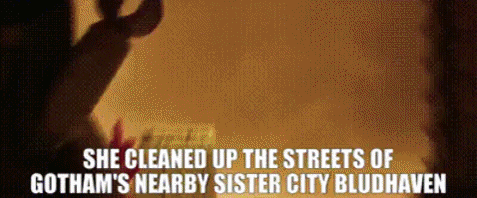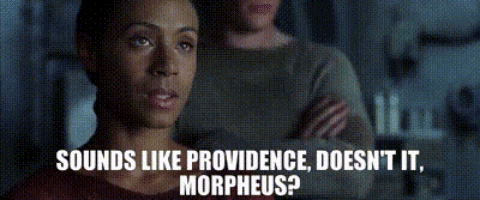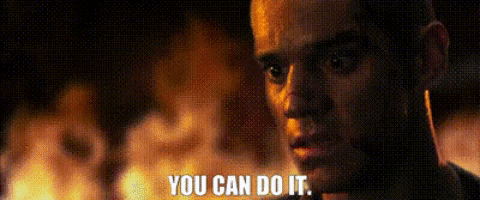“Why are so many people in America obsessed with Marilyn Manson; corpses; dead people; misery; John Wayne Gacy… John Wayne Gacy’s a fucking prick.
Y’know, he killed a few people and did some shitty paintings.
What’s that?
Why should we be engaged with that?
And yet that has become.. what, “apocalypse culture“?
Where do we go from there, that isn’t that?
Where do we go that isn’t playing with our own shite?
The Answer… back to the individual.
If the individual doesn’t work – if Patrick McGoohan was wrong; Number 6 was wrong to stand on that beach screaming “I am not a number, I am a free man!” – what do we have left?
Because ultimately the guy who’s not a number and not a free man experiences neurosis, the longer he goes down that path. I’m sure there’s a bunch of people here, like me, who eventually… you’ve worked your way through this stuff; you’ve read the books, you’ve done this shit; you’ve taken the drugs; you’ve been there, you’ve seen it. We’ve all experienced enlightenment in little bits. You know it’s out there; you know this stuff is true: the consensus doesn’t explain our lives. But what does?
Imagine getting rid of the individual. Imagine getting rid of that scaffolding. What do we have left? And here’s what I’m about to offer:
The more I looked into it, the more I began to see that we have these mutants living among us, right now. The people from the 21st century; from the end of the 21st century are here. But there is no context for them. In the same way that – y’know, if you lived in… Tunguska two hundred years ago, and you were an epileptic, you would be a shaman. There was a context for you. In this society, you’re an epileptic. It’s quite simple; it’s a disease, and nothing you say is of any worth because it’s considered pathology.
If, on the other hand, you look at these people, who are the mutants… and what do they call it? Multiple Personality Disorder.
This is what lies beyond the personality; the “I”; the bullshit.
Because if you take “I” to the limit – and like I said, I’m sure a lot of us here have done this – it becomes… all that happens is that self questions self. Endlessly; repetitively. “Am I doing this right? Is this the right way? Should I think about these people like this? Should I approach them this way; should I involve them this way?” Self questions self, endlessly, and it reaches a peak… it goes nowhere.
On the national scale, that same thing – self questions self; self encounters not-self; equals borders, war, destruction.. that’s where it goes. That’s where it ends. That thing ends in disaster.
It ends in neurosis on a personal level. And it ends in war on the national level.
So I began to think: “What could we replace that with?” And I was looking at these poor MPD fuckers. And I realised they just don’t have a context.
What would happen if we decided to abandon the personality, and replace it with a multiple personality complex? Because as we all know – everyone in here, I’m sure.. I mean, I feel as if I can say this for certain, knowing human beings as they are: sometimes you do things that you don’t want to do. Sometimes you do things that are contradictory to what you think. Sometimes you fuck yourself up.
Why? Because there’s not one person in here; there’s hundreds.
And if you start giving them names, and you start shuffling them about; if you start playing with them, you become a bigger human being. Because you’ve no longer allowed yourself to stop at your boundaries.
Imagine the personality as… let’s choose Windows, even though that’s a contentious one. Imagine the personality as Windows. Instead of the personality.. there’s so many people, I’m sure you’ve met them.. you talk to them, and they say “No, this is the way I am. I’ve worked on this. This is me. And I won’t change. And you’ll just have to work with that. This is me; this is important; this is what I’ve come to, and this is what I’ve Made Of Myself.”
Bullshit. It’s a trap. They don’t go anywhere; they’re stuck there.
What if those same people were then given Personality 2000? Which is an upgrade, and an add-on? And here’s a bit of your personality that likes hip hop? Here’s a bit to your personality that likes ballet? And because we’ve all got them. And we’ve got the fucker.. we’ve got the serial killer inside; we’ve got the wonderful new-age bastard… we’ve got whatever we like. We’ve got James Bond in there. We’ve got Pussy Galore in there. They’re all there.
So what I’m suggesting is that we start working with that. Abandon the personality; abandon the individual; abandon the “I” because it’s a lie, and it has held us down; it’s been like a weight round our necks. It was useful for the last two thousand years of history, because it created this out of the chaos that was – and this is more coherent; more useful; more meaningful. It has its problems; everything does; every system has – but we’re getting better.
And I think what we should do is walk away from the crap of the 21st century, and start thinking about what we’ve been experiencing.
My feeling about the 20th century, and about World War II and about Auschwitz and all of that stuff is that we had to go through it. We had to do it. That was humanity’s dark night of the soul, and it will never, ever happen again. But it had to happen.
Every single nightmare image, every image of hell that we have in our minds happened. Everything you can think of; people were flayed, brutalised, gassed, tortured, cut into pieces, turned into pigs – everything you can imagine happened. The world was a wasteland. There were cities completely annihilated. We went through it.
Why did we do that?
Stanislav Grof has a conception of the ‘perinatal matrices‘, which was one of the big influences on the film The Matrix. You might recognise some of this. He says that things that happen to us around birth are really profound, and they have all kinds of weird effects. They effect society, they effect the self; they effect everything. They have reverberations.
And he claims that there are several states, that he calls “Basic Perinatal Matrices”.
The first state is oceanic bliss – which we’re all familiar with, I’m sure. Oceanic fuckin’ bliss, mate. And that is the state of the baby in the womb, untouched – everything is provided for; everthing is there; everything you need will turn up out of the blue.
Basic Perinatal Matrix 2 is a different thing. It’s when the womb starts to turn a little toxic, and begins to suggest we’re about to be expelled. And, y’know, we don’t remember this stuff – what happened? What was the feeling of that fetus in there who suddenly thinks: “My entire universe has been overturned and I’m about to be shit out”? Does he know where he’s going? “What the fuck’s this? Y’know, I was happy there. It was cool; I was getting everything I wanted.”
And so on into BPM 4 – which is kind of a release from tension; which is the birth process.
So I’m beginning to think.. as a society – and returning to the idea of ontogeny as history.. phylogeny, or whatever the fuck the word is.. what we’re looking at now is humanity’s process through Grofian matrices.
And what we went through is actually a Stanislav Grof Basic Perinatal Matrix 3 experience.
Every image that he talks about: death camps, control, the idea of people.. babies trapped in tubes.. you’ll recognise all this from The Matrix, as I said.
Oil, mechanisms, machines that hate us; destructive technology.. it all happened.
What if this little baby that is the universe; this little larvae that’s approaching culmination, has had to go through these stages? Because everything does. If you want to get rid of war, how do you get rid of war? You inoculate yourself against war by having the worst fuckin’ war you’ve ever had in your life. And everything after that’s just an aftershock. We’ve done nothing worse than what we did in those few years. Humanity’s never come close to anything like it. We’ve tried; there’s been a few lunatics who’ve tried. But nothing on that scale.
So what if we choose to imagine that humanity has passed through that stage?
We’ve reached the 21st century, and we’re now approaching Basic Perinatal Matrix 4. Which is: victory after war. Which is: the struggle is over. Which is: we’re all here; what do we do next?
There was no apocalypse; there was no Christ. There was no rapture. There is nothing. All this stuff is shit.
There is only us. And we’ve still got another thousand years, and maybe another thousand beyond that, and maybe another twenty thousand beyond that.
What are we gonna do?
Who are we?
Are we gonna stick to these personalities; these bounded, territorial things?
Are we gonna expand ourselves; make ourselves bigger? So that if you happen to like.. [say] ‘world music’ and I don’t, I can tap into your love of ‘world music’, and experience it – and it means something.
So all I’m suggesting here is that we all take up magic. Because basically it works. We can change the world. It’s quite simple; the technology’s there. The Buddhists have been telling us.. as I said, people have been telling us this for so long. And in the last two hundred years, it’s been driven underground and we’ve forgotten.
And people like us are here today to try and recover something of that. And the way to recover it, is to do it. Do the techniques. Go buy an Aleister Crowley book; [or] buy one by Phil Hine or Peter Carroll that’s a bit more up to date, and you don’t have to bother with that 18th century fucking language. But do the shit, and you will find it works.
And we stand here now. This is the counterculture. We are the counterculture.. this is like, this shit. I went to this thing in, like, 1987 and it was Robert Anton Wilson and the whole deal – and I remember sitting in the audience thinking “fuck, rave is dead”. Because it was that kind of thing; that version of it’s dead. The hippy version of it’s dead.
We stand here. And we’re looking ahead. What are we gonna do?
Abandon the personality is what I suggest.
Get rid of the sense of self. Get rid of the sense of “I”, and make yourself something bigger. Imagine that every time you want to learn something new, it’s a new computer program; you can buy the operating system; the update. You can learn to fly a plane in seven days according to Neuro-Linguistic Programming – so why not? Let’s do it.
Do we want to change things? Or are we just sitting here talking?
No answer.
Are we talking at all? Do we want to change things? Yeah! Right – that’s why we’re fucking here, man. That is why we’re here!
So what are we gonna do?
If you want to change things, the first thing you have to change is yourself.
Because if you don’t change yourself, you will take on the world as if it is yourself – and fuck up. You will really fuck up, because you don’t understand your own dark side. If you don’t understand your own weird, shitty side.. if you don’t understand the fact that there’s someone in there who will kill your mother, if need be – if you can’t take that on; if you can’t take that on board and realise that Charles Manson and me and you are not much different; that John Wayne Gacy and me and you are not much different – except that he did it. Y’know, there’s those days when I’m gonna kill that motherfucker over there – but we don’t do it.
But it’s in us, and it’s there. And so much of this is denial. That we have no dark side. You know: the hippies, and those lovely people in the rave era who were all on ecstasy – they tried to pretend we have no dark side. And what happened was they got fucked up by their own dark side. As will always happen.
So let’s kiss our dark sides; let’s fuck our dark sides. Get him down there where he belongs. And he can tell us stuff. Y’know, that thing’s useful.
But above all: let’s become plex-creatures. Complex, superplex – be able to take on new personality traits; able to take on new ideas; able to adapt; able to extend our boundaries into what was previously the ‘enemy territory’ – until the point where we become what was once our enemy, and they are us, and there is no distinction.
Mad Cow Disease, or BSE, or CJD – Creutzfeld-Jacob Disease; it’s very interesting. It’s hitting the headlines; people are interested in these new 21st-century fucked up diseases that are gonna wipe us all out, apparently.
This is a disease – I’ve been studying this, coz it seems like a really good metaphor to use – CJD is a disease that attacks the brain and central nervous system and utterly demolishes them. Completely; you’re fucked. You will slide down a ramp like a stupid cow. You’ll fall on the concrete; you won’t be able to walk; your brain will turn to sponge. You’ll be eaten to bits.
You know that CJD does that without the immune system noticing? The immune system can’t detect CJD. By the time you’re slipping down the ramp like a cow, it’s all over. The immune system suddenly says: “Oh fuck; we’re in trouble.” Too late, mate.
So what happens if we act like BSE and CJD? What if we colonise the culture? What if we give it something it can’t swallow?
And this is a little bit like what Doug [Rushkoff] was saying earlier: we go in there; they want us. They’re desperate for us, because they think we know this shit; we know something they don’t know. We’re attached; we’re connected in some way that they don’t.. “they”, whoever “they” are; these poor bastards. They’re looking at us, like – coz I’ve got a leather jacket, I know something, y’know?!
But that’s what they think. And what I think has actually happened here is: the culture’s getting weirder and weirder.
Back home in Britain, Tony Blair is putting up cameras in every street corner. And he’s talking about putting cameras in peoples’ homes. He’s gotten rid of trial by jury. This is like, fascist Britain 1999, y’know?
But the more he does this, the weirder things get.
The more cameras you put up, the more people will start to act like movie stars. The more people start to act like movie stars, the weirder things get. And then the *more* cameras they put up to try and deal with it! And the weirder it gets!
So let ‘em bring the cameras; I’ll fucking act the shit out of these bastards! Let’s have the cameras. Let’s have cameras everywhere. And we’ll show them what we can do.
And they’ll be watching, going: “Man, that guy’s getting fucked; I wish I was.”
And they want in. They want in on this. So let’s, like Doug said, invite them in. Let’s take them in. Let’s be like the diseased prion that destroys its host, and CJD.
Let’s go in there and give them something they cannot digest. Something they cannot process. Something so toxic, so dangerous, so powerful.. that it will breed, and destroy them utterly.
Not destroy them – turn them into us. Because that’s what we want. We want everybody to be cool. We don’t want to go in and think: “That guy over there’s gonna kill me; that guy hates me; that guy’s got some fucking weird agenda.”
Don’t we just wanna talk? And let it all go, and just say: “Hey, I’m interested in you; what have you got to tell me?”
That’s what it’s all about, isn’t it? We communicate; we join up; we make networks; we make things happen.
And there are some people in the world who don’t wanna do that.
So let us infect them.
Infect them to the point where they become us.
Where there’s nothing left in this world, but us.
And then some kid’ll come up and fuck that as well.
And that’ll be exactly what we need at the time.
And that’s me finished, so thank you very much.”


